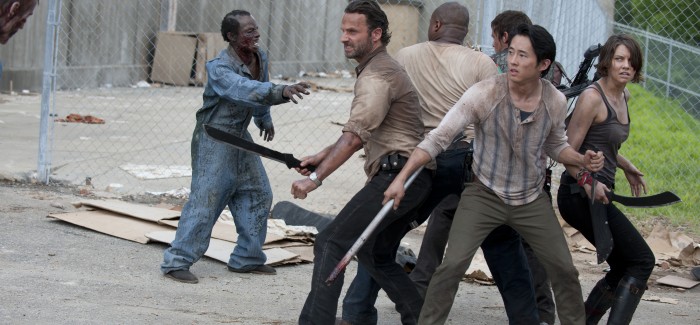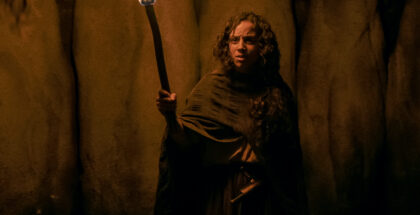Amazon Prime / Blu-ray review: The Walking Dead Season 3
Review Overview
Brains
8BRAAAAAINS
8David Farnor | On 03, Oct 2013
If you had to pick a TV series that would make it to a third season, The Walking Dead probably wouldn’t be it. After 20 odd episodes of zombies, what could another 16 possibly have to offer? More zombies? That’s where AMC’s show is smart: it does offer more zombies, but not the undead kind – these are the living, breathing kind, the ones waiting to turn. At the end of the day, this is a show about humans, not zombies. The dead people walking.
It all hinges, then, on having humans you actually care about. That’s where AMC’s show is a success. Mostly.
Season Two ended with an undead army attacking old man Hershel’s (Scott Wilson) farm, but that battle came second to the other showdown at hand: the one between good cop Rick (Andrew Lincoln) and psychotic best friend Shane. The ensuing confrontation set Rick on a collision course with his own ego; the season ended with him appointing himself the dictator of the group.
Season Three sees Rick attempting to deal with his actions – and bring some form of normality to the world. Taking refuge in a nearby abandoned prison, the group swiftly carve out part of the campus and set about making it their home. Grass for crops, fences for security and guard towers to pick off unwanted guests? Jail is a change to liberate themselves from the death all around, especially with a baby on the way.
If The Walking Dead has suffered from one thing, though, it’s repetition. There’s only so many times people can be in peril and escape with your sympathy in tact. Thankfully, showrunner Glen Mazzara switches things up a few episodes into the new run, splitting up Andrea from the rest of the group following Season Two’s finale. She stumbles across Michonne, a silent but deadly loner with a samurai sword and two walkers for pets, and, eventually, a man called The Governor. He, it turns out, runs a settlement down the road from the prison: a nice, happy village full of butterflies and rainbows and other things that suggest not all is what it seems.
Played by David Morrissey, The Governor is a horrible piece of work: a guy with a taste for violence and a ruthless ambition, but a smile you could take home to your mum. Once he starts sporting an eye-patch to go with his roguish charm, the effect is complete: Morrissey has never been so repulsive or so worryingly attractive.
No wonder Andrea falls for him, a position that sees her caught between a rock and a hard place. If, by rock, you mean prison and hard place, you mean rival civilisation ready to wage war.
With her confused emotions and inability to see through The Governor’s lies, Andrea’s journey may well annoy viewers during the second half of the season. Michonne’s mute outcast is equally hard to sympathise with. But together, their story provides a much-needed change of pace from the grisly events of Rick’s party.
Behind bars, the scripts are allowed to do their best work, slowing right down to feel character beats for everyone in the group: Norman Reedus as Daryl Dixon (an original character for the screen) nails his transition from wild outsider to dependable hero in This Sorrowful Life (Episode 15); Wilson’s pensioner comfortably carries on Dale’s former role of moral compass; while Melissa McBride astonishes as Carol, who grows from a feeble, passive victim into a determined, fully-fleshed female fighter.
Rick’s family, though, remain the heart of the show. Andrew Lincoln’s attempts to reconcile survival with compassion have driven the show since its opening episode – a brief cameo within Clear (Episode 12) is a haunting reminder of what could have happened to his human side. Egged on by his new antagonist, The Governor, The Walking Dead takes what could be a schlocky gore fest into the tragic arc of a good man – without ever losing sight of his possible redemption. He even stops wearing his silly cop hat.
What gives Season Three its renewed punch, though, is the development of Rick’s son, Carl. Given a key role play in The Killer Within, the prospect of him following in his father’s footsteps underscores events with a harrowing, sad note.
That slow progression is not to everyone’s tastes, but The Walking Dead still delivers on the horror – by the bucketload. Cleverly using the prison as a location for set pieces, zombies hurtle through confusing corridors and pen people in, expertly ramping up the claustrophobia. All the while, the directors show an uncanny knack for positioning their cameras in the sweet spot: if an arrow is about to poke out a walker’s eye, you can bet your lower intestine where the audience will end up.
The result is a strong third entry in a franchise that proves it’s really got legs. The show may keep swapping writers like Noel Edmunds in his heyday, but with Scott Gimple (writer of the aforementioned standout episodes) now at the helm, the prospect of The Walking Dead shuffling into Season Four is a juicy one.
The Walking Dead Season 3 is available to watch online on Amazon Prime, as part of a £5.99 monthly subscription.
Where can I buy or rent The Walking Dead Season 3 online in the UK?
Where can you watch The Walking Dead online in the UK? Click here to find out.























